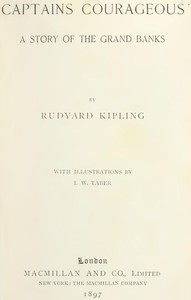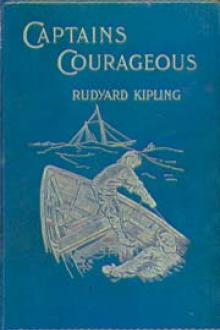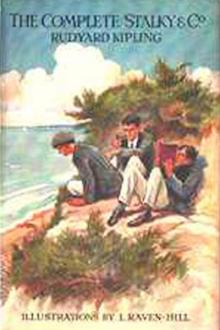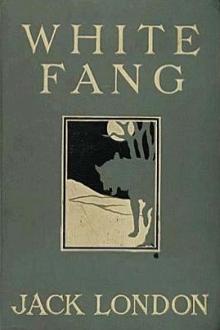"Captains Courageous": A Story of the Grand Banks by Rudyard Kipling (books for 6 year olds to read themselves txt) 📗

- Author: Rudyard Kipling
Book online «"Captains Courageous": A Story of the Grand Banks by Rudyard Kipling (books for 6 year olds to read themselves txt) 📗». Author Rudyard Kipling
"Nex' cast they got ninety. Sez Counahan: 'Either the lead-line's tuk too stretchin' or else the Bank's sunk.'
"They hauled ut up, bein' just about in that state when ut seemed right an' reasonable, and sat down on the deck countin' the knots, an' gettin' her snarled up hijjus. The Marilla she'd struck her gait, and she hild ut, an' prisintly along come a tramp, an' Counahan spoke her.
"'Hey ye seen any fishin'-boats now?' sez he, quite casual.
"'There's lashin's av them off the Irish coast,' sez the tramp.
"Aah! go shake yerself,' sez Counahan. 'Fwhat have I to do wid the Irish coast?'
"'Then fwhat are ye doin' here?' sez the tramp.
"'Sufferin' Christianity!' sez Counahan (he always said that whin his pumps sucked an' he was not feelin' good)—'Sufferin' Christianity!' he sez, 'where am I at?' "'Thirty-five mile west-sou'west o' Cape Clear,' sez the tramp, 'if that's any consolation to you.'
"Counahan fetched wan jump, four feet sivin inches, measured by the cook.
"'Consolation!' sez he, bould ez brass. 'D'ye take me fer a dialect? Thirty-five mile from Cape Clear, an' fourteen days from Boston Light. Sufferin' Christianity, 'tis a record, an' by the same token I've a mother to Skibbereen!' Think av ut! The gall av um! But ye see he could niver keep things sep'rate.
"The crew was mostly Cork an' Kerry men, barrin' one Marylander that wanted to go back, but they called him a mutineer, an' they ran the ould Marilla into Skibbereen, an' they had an illigant time visitin' around with frinds on the ould sod fer a week. Thin they wint back, an' it cost 'em two an' thirty days to beat to the Banks again. 'Twas gettin' on towards fall, and grub was low, so Counahan ran her back to Boston, wid no more bones to ut."
"And what did the firm say?" Harvey demanded.
"Fwhat could they'? The fish was on the Banks, an' Counahan was at T-wharf talkin' av his record trip east! They tuk their satisfaction out av that, an' ut all came av not keepin' the crew and the rum sep'rate in the first place; an' confusin' Skibbereen wid 'Queereau, in the second. Counahan the Navigator, rest his sowl! He was an imprompju citizen!
"Once I was in the Lucy Holmes," said Manuel, in his gentle voice. "They not want any of her feesh in Gloucester. Eh, wha-at? Give us no price. So we go across the water, and think to sell to some Fayal man. Then it blow fresh, and we cannot see well. Eh, wha-at? Then it blow some more fresh, and we go down below and drive very fast—no one know where. By-and-by we see a land, and it get some hot. Then come two, three nigger in a brick. Eh, wha-at? We ask where we are, and they say—now, what you all think?"
"Grand Canary," said Disko, after a moment. Manuel shook his head, smiling.
"Blanco," said Tom Platt.
"No. Worse than that. We was below Bezagos, and the brick she was from Liberia! So we sell our feesh there! Not bad, so? Eh, wha-at?"
"Can a schooner like this go right across to Africa?" said Harvey.
"Go araound the Horn ef there's anythin' worth goin' fer, and the grub holds aout," said Disko. "My father he run his packet, an' she was a kind o' pinkey, abaout fifty ton, I guess,—the Rupert,—he run her over to Greenland's icy mountains the year ha'af our fleet was tryin' after cod there. An' what's more, he took my mother along with him,—to show her haow the money was earned, I presoom,—an' they was all iced up, an' I was born at Disko. Don't remember nothin' abaout it, o' course. We come back when the ice eased in the spring, but they named me fer the place. Kinder mean trick to put up on a baby, but we're all baound to make mistakes in aour lives."
"Sure! Sure!" said Salters, wagging his head. "All baound to make mistakes, an' I tell you two boys here thet after you've made a mistake—ye don't make fewer'n a hundred a day—the next best thing's to own up to it like men."
Long Jack winked one tremendous wink that embraced all hands except Disko and Salters, and the incident was closed.
Then they made berth after berth to the northward, the dories out almost every day, running along the east edge of the Grand Bank in thirty-to forty-fathom water, and fishing steadily.
It was here Harvey first met the squid, who is one of the best cod-baits, but uncertain in his moods. They were waked out of their bunks one black night by yells of "Squid O!" from Salters, and for an hour and a half every soul aboard hung over his squid-jig—a piece of lead painted red and armed at the lower end with a circle of pins bent backward like half-opened umbrella ribs. The squid—for some unknown reason—likes, and wraps himself round, this thing, and is hauled up ere he can escape from the pins. But as he leaves his home he squirts first water and next ink into his captor's face; and it was curious to see the men weaving their heads from side to side to dodge the shot. They were as black as sweeps when the flurry ended; but a pile of fresh squid lay on the deck, and the large cod thinks very well of a little shiny piece of squid-tentacle at the tip of a clam-baited hook. Next day they caught many fish, and met the Carrie Pitman, to whom they shouted their luck, and she wanted to trade—seven cod for one fair-sized squid; but Disko would not agree at the price, and the Carrie dropped sullenly to leeward and anchored half a mile away, in the hope of striking on to some for herself.
Disko said nothing till after supper, when he sent Dan and Manuel out to buoy the "We're Here's" cable and announced his intention of turning in with the broad-axe. Dan naturally repeated these remarks to a dory from the Carrie, who wanted to know why they were buoying their cable, since they were not on rocky bottom.
"Dad sez he wouldn't trust a ferryboat within five mile o' you," Dan howled cheerfully.
"Why don't he git out, then'? Who's hinderin'?" said the other.
"Cause you've jest the same ez lee-bowed him, an' he don't take that from any boat, not





Comments (0)